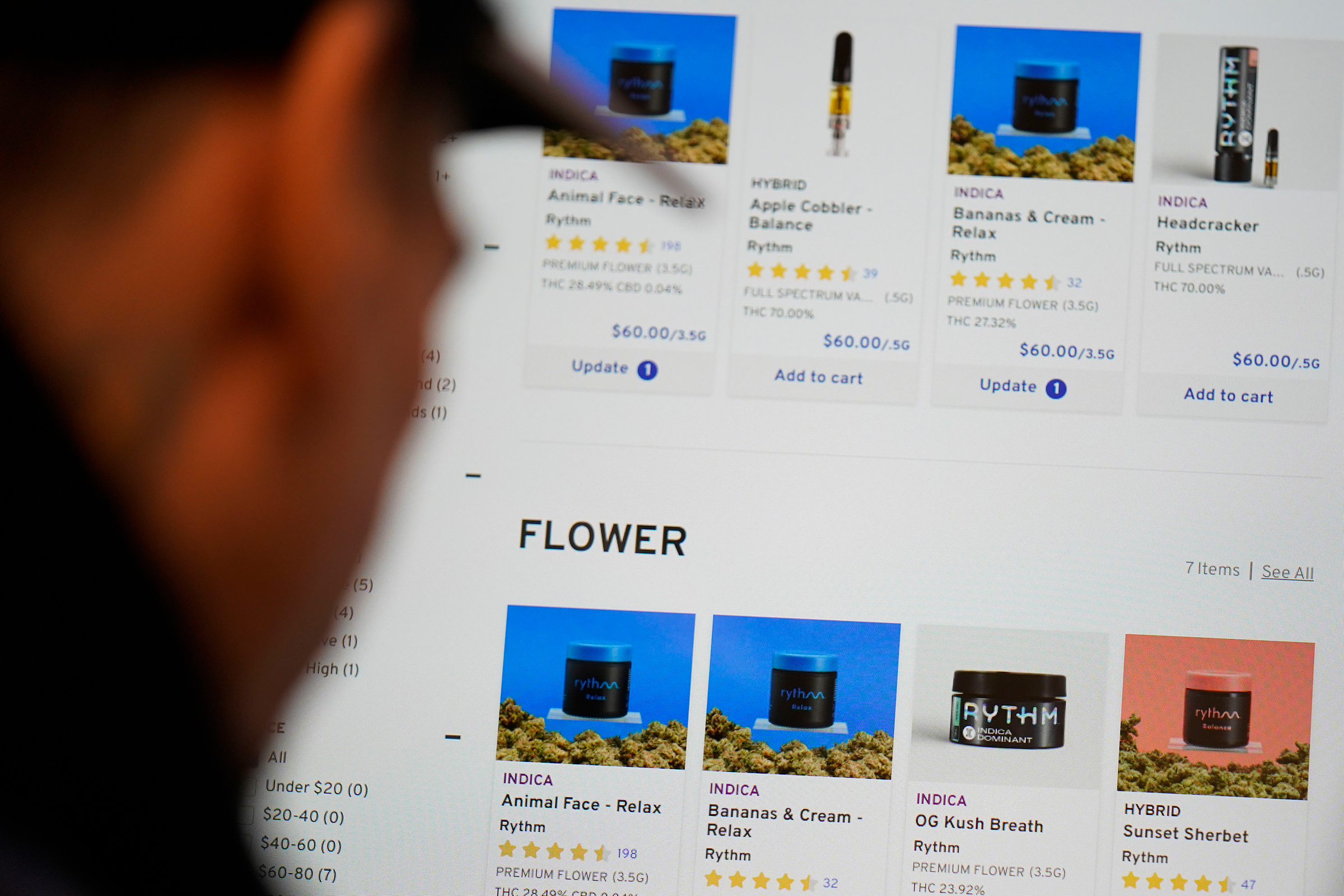
Marijuana is having a moment. Following the midterm elections, cannabis is legal in about half of U.S. states—despite getting voted down in three ballot measures on Tuesday in deep-red states. Weed is also attracting new investments from entrepreneurs ready to cash in on its popularity, as witnessed by Sean “Diddy” Combs’ recent $185 million purchase of a collection of cannabis retail and production facilities.
There are roughly 10,528 licensed retail stores selling all manner of marijuana, hemp, and CBD-related wares in the U.S. today, up from 2,920 in 2018—and more are popping up in almost every city where weed is legal, according to research firm Cannabiz Media. Many of these stores are seeing net profit margins between 15-20%, according to the Northstar Financial Consulting Group.
Even as these brick and mortar stores proliferate, some entrepreneurs say the future of the industry lies online. A number of new cannabis tech startups have launched apps and mobile websites in recent years. Some aim to replicate the Uber-Eats model, helping customers get products delivered right to their door. Others style themselves after AirBnb and help people rent their homes to cannabis users looking for a place to smoke and sleep.
Although cannabis isn’t federally legal, tech startups that capitalize on the drug’s ever-growing popularity have potential to be wildly lucrative businesses. Americans are smoking more marijuana than tobacco cigarettes for the first time in history, and legal cannabis sales in the U.S. are expected to exceed $57 billion annually by 2030.
Read More: Where Marijuana Legalization Failed in the 2022 Midterm Elections
Despite the potential growth, entrepreneurs face steep challenges in getting around federal regulations for cannabis sales—not to mention that online commerce isn’t always an easy process. “There are certainly potential legal difficulties with these new technology and business models,” says Alex Kreit, an assistant law professor at Northern Kentucky University and the director of its Center on Addiction Law and Policy. “But a lot of these businesses will have an incentive to try to make their technology compliant with the law.”
How online retail works

Operating a profitable cannabis store can be challenging in the current climate. Small business owners are likely to find that real estate costs are higher, insurance companies may deny them coverage, and competition in storefront spaces is tight, as many competing cannabis businesses spring up simultaneously in places where it’s popular. Those factors appear to be forcing a growing number of cannabis stores to move online and create partnerships to reach more customers.
“Everything is about to go online,” says Henry Calix, the founder of Weedsies, a Miami-based digital cannabis startup that helps farms reach customers. “A lot of [landlords] don’t want to lease to a dispensary, so instead of opening a brick and mortar store, more cannabis farms are becoming the retailer as well.”
Enter platforms like Weedsies and Leafly. These popular startups aren’t growing cannabis or even selling it, but rather connecting dispensaries with retail customers through their mobile app and website. It’s like an online marketplace for weed, where the host provides a space for vendors to market and sell their products for a lower fee than it costs to operate a storefront. And the companies that host these marketplaces see themselves as any other tech platform, making a mark on a relatively new industry.
“We’re a technology platform that leverages our proprietary data and content to connect consumers with the right cannabis products offered by local brands and retailers,” says Yoko Miyashita, the CEO of Leafly, a publicly traded online cannabis marketplace with roughly 8 million monthly active users. On Leafly, anyone over the age of 21 can enter a location on its website or app and begin browsing cannabis products from vendors across the country, which can be purchased if it’s legal in their area. The platform also helps users learn more about a variety of cannabis strains and products, with more than 1.3 million user-generated reviews. Weedsies operates similarly, but its app is coded using location services so users can only browse products from vendors if they are physically located in a state where it’s legal.
Both of these platforms are inextricably linked to the cannabis industry, but, technically-speaking, they don’t sell any cannabis—and therefore don’t need to hold a retail license, which can cost around $10,000 each year and carries legal restrictions. “The dispensaries use their own cannabis licenses to sell through our platform,” Calix says. “We don’t hold the license in each state.”

Still, the legality of selling and delivering cannabis online is complicated. Although two more states—Maryland and Missouri—legalized recreational cannabis on Tuesday, bringing the national total to 21 and the District of Columbia, it remains a federal crime to take the drug over state lines. Someone convicted of crossing a state border with the substance can face up to five years in prison and fines of up to $250,000 for possessing less than 50 kilograms.
In California, deliveries can take place anywhere within the state regardless of where the vendor is licensed to sell. For these transactions to remain legal, online vendors have to make sure they are complying with city and state laws before making a delivery. Some states, however, have tried to crack down on the sale of cannabis across state lines. In Oregon, deliveries are required by law to take place within the city of the licensee. “There are places right across the border from a city where cannabis is legal that GPS or technology isn’t able to catch,” says Kreit, the law professor. “If we have a regulatory regime at the state level that’s restricting deliveries on a locality by locality basis, that inherently makes it more difficult to comply with.”
What the future looks like

The nationwide shift in drug policy in recent years has created a number of new protections for marijuana users in some states. The latest protections came on Tuesday, when voters in Maryland and Missouri passed ballot measures to legalize the recreational use of marijuana for adults, though voters in Arkansas, North Dakota, and South Dakota rejected ballot measures on the issue.
In California, lawmakers passed a bill in late August that would restrict companies from penalizing employees who use marijuana while they’re off the clock. In New York and other states, employers are prohibited from testing their workers for the presence of marijuana. And with cannabis likely on the ballot again in 2024, it’s possible more states adopt similar protections in coming years.
After Tuesday’s voting results, about 48% of the U.S. population lives in a state where cannabis is fully legalized, and more than 75% live in a state where the drug is legal for medical use. In states where recreational cannabis is legal, people can smoke the drug anywhere, and police officers are not permitted to stop and search pedestrians only on the basis of smelling it. And the legalization efforts could be paying off: The industry created more than 105,000 U.S. jobs in 2021, on par with the number of jobs created in the financial sector and construction industry.
The thriving market hasn’t erased some of the difficulties associated with running a cannabis business. “There’s still a stigma around cannabis even though it’s becoming more normalized,” Calix says. “And even when it gets federally legalized, we’ll probably continue to face that stigma from the banking industry.”
It took Calix six months to open a bank account for Weedsies, he says, because banks thought his company was growing and selling cannabis. And some merchant processors still label hemp-derived CBD as a high-risk industry, even though it was federally legalized in 2018 (high-risk merchant accounts pay higher processing fees).
“I thought the best thing to solve a lot of those issues was technology,” Calix says. “Create an online marketplace, and allow vendors to promote their brands, promote their products, and even sell all under one roof.”
So far, the model is working—and online cannabis marketplaces could get a major boost if the drug becomes legalized federally, a move the Biden Administration seems open to making after announcing it would revisit the way cannabis is classified under the federal drug code.
“Could we be the Amazon of weed?” Leafly CEO Miyashita asks. “Absolutely.”
More Must-Reads from TIME
- Why Biden Dropped Out
- Ukraine’s Plan to Survive Trump
- The Rise of a New Kind of Parenting Guru
- The Chaos and Commotion of the RNC in Photos
- Why We All Have a Stake in Twisters’ Success
- 8 Eating Habits That Actually Improve Your Sleep
- Welcome to the Noah Lyles Olympics
- Get Our Paris Olympics Newsletter in Your Inbox
Write to Nik Popli at nik.popli@time.com